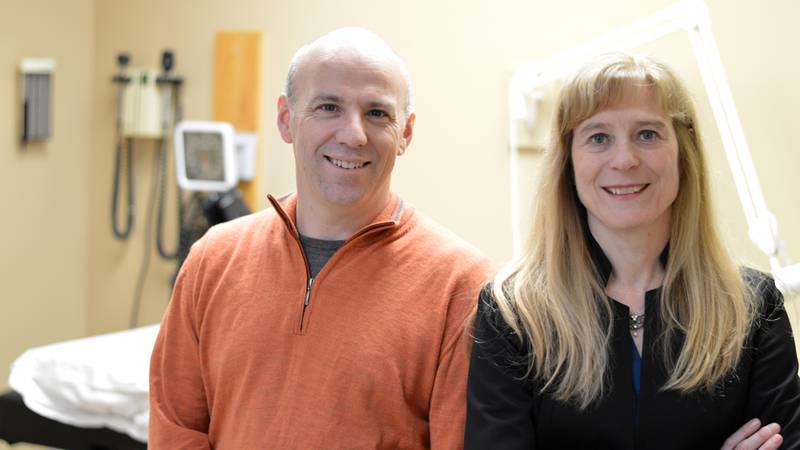QEII psychiatrist Dr. Cindy Calkin was treating patients with bipolar disorder when she noticed some were no longer responding to mood-stabilizing treatments. She wanted to know why.
“That’s when I started to notice the high rates of obesity and the metabolic syndrome; a lot of them had all sorts of cardiovascular risk factors,” Dr. Calkin says.
The same patients had high rates of insulin resistance and Type 2 diabetes. In fact, it was triple the rate of the general population, and more than half of bipolar disorder patients had it — and most didn’t even know. They also suffered from more rapid mood swings, with up to four or more distinct episodes a year.
In 2013, Dr. Calkin established the Mood and Metabolism Program at the QEII Health Sciences Centre and brought in endocrinologist Dr. Tom Ransom for his knowledge of metabolic issues. Dr. Ransom, who started his career as a dietician, had independently noticed that his diabetes patients had high rates of mood disorders.
Usually, medical professionals treat the brain problems first, and then the body. They decided to treat both together.
“The key is the brain basically governs the entire body. The fact that something else going on in the body might affect the brain, and something going on in the brain — like bipolar disorder — might affect the body, just makes sense to me. We’re going back to the very basic principle of treating the entire patient,” Dr. Calkin says.
Dr. Ransom agrees. “For a non-psychiatrist, the brain is just another organ or gland that sometimes you need medications to help it. It’s so intertwined with the rest of the body, it’s almost baffling that it ever got medically separated.”
The program customizes treatment for the individual by adjusting medications, changing diet and helping patients lose weight.
“It’s really quite powerful and will affect their insulin resistance,” Dr. Ransom says.
They’ve also looked at the blood-brain barrier. It keeps blood circulation apart from the brain, and they suspect in some cases, the barrier gets leaky, worsening bipolar disorder. They have about 80 patients in the program and are gathering data over several years to help them draw conclusions. Already, they are seeing improvements in mood with weight loss and reversal of insulin resistance. Patients report feeling much better, overall.
“I think there’s a misconception that if someone’s mood is off, they don’t care about the rest of their health. They care about their mood — they want their mood to be better — but they also want the rest of their health to be better,” Dr. Ransom says.
Sarah strongly agrees. About eight years ago, her bipolar disorder was “out of control.” She started going to the clinic and discovered she had insulin resistance. “Once I became a bit more stable with Dr. Calkin’s help, we looked into the study and then into the Mood and Metabolism Program, ” she says.
Sarah lost some weight, adjusted her medication and found “my mind started to work again.”
“I always saw them in my head as two different things. ‘Well, if I can just get my mind better, then I can focus on everything else.’ But now that I’m focusing on it all as a whole, I’ve never been better,” Sarah says.
Now living in New Brunswick, Sarah continues to receive treatment at the QEII. She says everyone from the research assistants to the receptionist and doctors have helped her rebuild her life. “I think the biggest thing about the program that I personally love, coming from a health background, is that I’m not just focusing on my mental health, but also my physical health,” she says.
“I thank my lucky stars every day.”








